
A new report has shaken up El Salvador’s bold Bitcoin story. All year long, President Nayib Bukele and the National Bitcoin Office promised they were buying one BTC every day.
Public trackers even showed holdings climbing past 6,102 BTC. Yet the IMF’s July 15 Article IV consultation says there were no new purchases since the $1.4 billion Extended Fund Facility was approved in December 2024.
Internal Wallet Moves Created Illusion Of Buying
According to the IMF report, the rise in public‑sector Bitcoin didn’t come from fresh spending. Instead, government‑owned wallets moved coins around.
Those transfers made balances pop up on public dashboards. But those were just internal shifts. They didn’t draw on taxpayer money or involve the market. Small ups and downs in the Chivo e‑wallet also came from internal corrections, not new deposits.
Turns out the IMF did in fact make El Salvador stop Bitcoin purchases in order to get a fiat loan.
Footnote #9 states they have just been making it appear as if they have been continuing to buy but in fact have just been consolidating multi government wallets.
Source :… pic.twitter.com/46AFU1oi08
— Magoo PhD (@HodlMagoo) July 17, 2025

Pressure On Bitcoin Legal Tender Reversal
Back in 2021, El Salvador grabbed headlines by making Bitcoin legal tender. That move set off cheers and warnings around the world. Reports show the country flipped that decision in January 2025 under pressure from international lenders.
They stripped Bitcoin of its legal‑tender status and agreed to stop using public funds for more coins. The IMF now confirms those promises held true.
Deadline Looms For Chivo E‑Wallet Exit
Based on reports, the government must end public‑sector involvement in the Chivo system by July 31, 2025. That date is just around the corner. El Salvador has also promised to unwind Fidebitcoin, the public Bitcoin trust it set up. Both steps aim to boost fiscal transparency and keep the Extended Fund Facility on track.

El Salvador President Nayib Bukele. Source: Getty Images
Analysts Eye Trust And Transparency Questions
Some experts say the big takeaway is about trust. Shuffling coins between wallets while claiming new buys can hurt the government’s credibility. Citizens and investors could start to wonder what else might be spun into a story.

Image: REUTERS/Johannes P. Christo/File Photo
Even if no fresh money changed hands, the mismatch between claims and reality has put a spotlight on how data gets shared.
The IMF gave credit for meeting its program targets. Yet the coming weeks will show if the government follows through on all its commitments.
Clearing out Chivo and dissolving Fidebitcoin are major moves. If El Salvador sticks to the plan, it could reset its narrative. If not, skeptics will find new reasons to doubt every future Bitcoin announcement.
Featured image from Unsplash, chart from TradingView

Editorial Process for bitcoinist is centered on delivering thoroughly researched, accurate, and unbiased content. We uphold strict sourcing standards, and each page undergoes diligent review by our team of top technology experts and seasoned editors. This process ensures the integrity, relevance, and value of our content for our readers.

